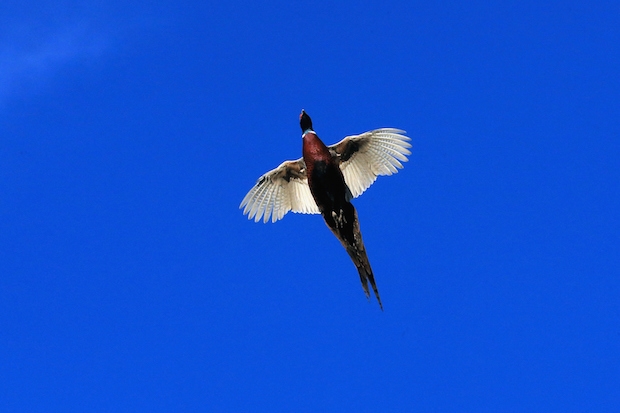From ‘Animal Sentries’, The Spectator, 27 February 1915:
OBSERVERS of birds have been much interested by the evidence, which seems to be fairly satisfactory, that pheasants in as remote a part of England as Westmorland were disturbed by the firing in the North Sea on the day of Sir David Beatty’s action and showed many signs of excitement. The first evidence came from the Rev. W. M. L. Evans, of Busby, Lincolnshire, who related in a letter to the Times how on Sunday morning, January 24th, his clerk met him with the announcement “There be rare goings on in the North Sea the morn.” When asked to explain the clerk said “The pheasants is all over the place with their fuss”; and many other villagers confirmed this statement.
Then Lady Lonsdale wrote from Lowther to say that during the battle the keepers noticed that the pheasants made a great and unusual crowing. Finally, Canon Rawneley sent to the papers last Monday the results of his investigations on the subject. At three different places in Cumberland the crowing of the pheasants was very noticeable between 9.45 and 10.30. In Yorkshire—at York, Base, Wyland Abbey, Risplith, Market Weighton, West Ayton, Brompton, and Langdale End—the same restlessness and crowing were noticed; also at Runcorn in Cheshire.
No doubt similar evidence could be collected from many other places. Canon Rawneley’s correspondents spoke of the pheasants as flying high up into the air, ” churraking,” and behaving with more than the fluster which generally attends the disturbance of a covert. It is well known that a bird’s ear is capable of recording impressions to which the human ear is not sensitive, and in the case of the sounds of January 24th it is not at all surprising that pheasants should have been disturbed by them. For they were heard by human beings fairly distinctly, as Canon Rawnsley says, as far inland as Risplith, near Ripon. The present writer’s gardener listened to them at a place in Essex for a long time, and mentioned them many hours before either he or the present writer knew that an action had been fought in the North Sea. The sounds were a long and low rambling, quite different from the distinct shocks of guns fired within a few miles.






Comments